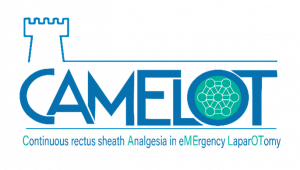 GAP study completes recruitment!
GAP study completes recruitment!
GAP study is investigating the safety, effectiveness and cost-effectiveness of gabapentin for pain relief in patients undergoing cardiac, thoracic or abdominal surgery. Gabapentin is regularly used ‘off label’ by clinicians to control post-surgical pain – but there is limited evidence to show whether it is effective or benefits patients. A total of 1197 participants from 3 clinical specialities joined the study. Study teams at 7 sites managed to recruit the target number of participants two weeks before the study was due to close to recruitment at the end of May 2022. This is a fantastic achievement.
GAP study participants were randomly assigned to receive either gabapentin or identical looking placebo pills immediately before their surgery and for 2 days afterwards. The primary outcome is length of hospital stay; secondary outcomes include in-hospital pain scores, opioid use, adverse health events, long-term pain and quality of life at 4 weeks and 4 months after the surgery. The study is also collecting data on how often patients access NHS resources up to 4 months after the surgery to measure cost-effectiveness of the treatment.
The GAP study is the largest randomised controlled trial of gabapentin in this population to date. The results will help clinicians decide whether to prescribe gabapentin to patients in the future. Now that recruitment is complete, we have started the 4 month follow up period. Data cleaning is underway to ensure data is accurate and complete before the database is locked in October 2022. The final report will be available from early 2023.
Best Emollients for Eczema (BEE) Study: Results
The Best Emollients for Eczema trial has found that no one type of moisturiser is better than another. This study, the first in the world to directly compare different types of moisturisers, highlights the importance of patient education and choice when deciding which moisturisers to use for children with eczema.
Moisturisers (also called emollients) are recommended for the one in five children who have eczema (also known as atopic eczema/dermatitis), which causes dry and itchy skin.
In the study, 550 children with eczema aged under 12 years were randomised to use one of four types of moisturiser (lotion, cream, gel or ointment) as their main moisturiser for 16 weeks.
Used alongside other eczema treatments, there was no difference in effectiveness of the four types of moisturiser used in the study. Skin reactions such as itching or redness were common with all moisturiser types.
The findings challenge conventions about how often moisturisers need to be applied, which types are less likely to cause problems and which patients should be recommended certain types.
It also shows that one size does not fit all, and points to the need for doctors to make parents aware of the different emollient types and to help them choose which one is mostly likely to work for them.
Watch a video summary and find links to the publications of the results.
Twitter: @bee_study @riddmj
Study Manager: Sian Wells
The study was funded by the NIHR Health Technology Assessment programme (reference 15/130/07). The views expressed in this publication are those of the authors and not necessarily those of the NHS, the NIHR or the Department of Health and Social Care.
Southwest Research Hub Annual Meeting
The South West Research Hub is a collaboration between five Clinical Trials Units (CTUs): Bristol Trials Centre, Centre for Trials Research Cardiff University, Exeter Clinical Trials Unit, Peninsula Clinical Trials Unit and Swansea Trials Unit. The Hub brings together trial management professionals from these regional CTUs, and affiliated research groups, to share innovations, experience and best practice.
On the 16th June we were delighted to hold our first annual meeting since the COVID19 pandemic. This was an online event showcasing work from the 5 trials centres. Research areas presented included: COVID19, inclusivity, obesity, cancer, dementia, diabetes and parkinsonian syndromes. The meeting also included two guest speakers. Ifan Jones from the Clinical Research Network (CRN) discussed the role and structure of the CRN and the future direction of the network. Margaret Ogden talked through her 15yr journey as patient and public involvement representative, from reviewing study documents to analysing study data and becoming a co-applicant on grants. As well as being passionate about research Margaret is a keen writer. Please see below for a poem she wrote about the meeting.
We are looking forward to holding a face-to-face meeting in 2023.
If you would like to join the organising committee or have any news/experiences or networking opportunities that you would like to share with your colleagues across the South West please email southwesthub-group@bristol.ac.uk
New Study: CAMELOT 
CAMELOT aims to find out whether adding Rectus Sheath Catheters (RSC) to standard patient-controlled analgesia (PCA) provides better pain relief, fewer side effects and complications, and greater satisfaction for patients undergoing emergency laparotomy. It will also determine whether RSCs are safe and cost-effective.
The study will be a multicentre, pragmatic, Randomised Control Trial based in NHS hospitals with patient and outcome assessor blinding, an internal pilot phase and parallel cost effectiveness analysis. 750 patients will be recruited over 36-months (12-months internal pilot, 24-months main trial) and all participants will be followed up for 6-months. Patients will be randomly assigned to either the intervention or comparator group. The intervention group will have two RSCs with an infusion of local anaesthesia for 72 hours after plus standard analgesia, including PCA. The comparator group will have standard analgesia, including PCA, but no RSCs. Identical looking catheters (sham) will be attached on the skin surface, but no local anaesthetic will be given.
Patients 18 years or over, undergoing emergency laparotomy surgery eligible for inclusion in the National Emergency Laparotomy Audit AND requiring a midline incision will be approached to take part in CAMELOT.
Email: CAMELOT-trial@bristol.ac.uk

